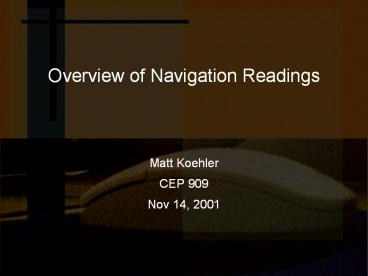Overview of Navigation Readings - PowerPoint PPT Presentation
Title:
Overview of Navigation Readings
Description:
How people use the system is probably influenced by a lot of things Prior Knowledge Learning Style Individual differences (age ... PowerPoint Presentation Author: WSE ... – PowerPoint PPT presentation
Number of Views:74
Avg rating:3.0/5.0
Title: Overview of Navigation Readings
1
Overview of Navigation Readings
- Matt Koehler
- CEP 909
- Nov 14, 2001
2
Nielson
- The problem of being lost in hyperspace
- Strategies for avoiding it
- Guided Tours
- Easy to Backtrack
- History Lists
- Bookmarks
- Overview Diagrams (many forms - avoid spaghetti)
- Use of Metaphors
3
Dee-Lucas Study Overview
- Contrast Overview is a listing vs. Overview is
hierarchically organized vs. No overview
(traditional text). - Students read all text, then left to review with
the listing or hierarchical organization - Subjects Completed Summary of main points,
free-recall of all content, recall of unit names,
useability evaluation. - Experiment 1 Vague learning goal (study for some
unspecified test - Experiment 2 Goal was to write a summary
- Experiment 3 More vs. Less segmented hypertext
4
Dee-Lucas Study Findings
- Useability Hierarchical reported as easier to
use than simple listing - Recall of Unit Titles Groups with an overview
much better at recall titles (no diff linear vs.
hierarchical) - Locations Hierarchical group was better able to
locate the information in the hypertext - Review Strategies Less subjects reviewed
material in linearly structured overviews in Exp
1, but not Exp 2. List overviews lead to LONGER
time spent reviewing.
5
Dee-Lucas Study Findings
- Free Recall No differences
- Summary Writing linearly structured overviews
led to less ideas in the review - More segmented hypertext Longer times to select
something to read, Able to recall more titles
(but there are more titles), less able to recall
common titles, better able to recall location of
information, less likely to review irrelevant
information - Recalling and Reviewing in more segmented
hypertext No difference on number of ideas
recalled, but more likely to recall details and
less big ideas.
6
Dee-Lucas Summary
- Structure (hierarchal) Better recall, more
efficient use of software. Might be bad that
students dont encounter off-task information. - Less structure Might be better for extremely
motivated learners with a particular learning
goal.
7
Ford and Chen Overview
- Seek to relate learning styles with what subjects
do with what they learn - Cognitive styles
- Field Dependence the degree to which a persons
perception of information is affected by the
surrounding perceptual contextual field.
(Embedded Figures Test.). These people require
more external structure and instructions. - Field Independent Provide their own structure,
think outside the box, etc. - Holists vs. Serialists
8
Ford and Chen Results
- Field Dependent People Make greater use of the
map, less use of the index, less use of back/fwd
buttons, spend time on higher-order ideas, less
time on details, no learning differences - Learning was predicted by Past experience (web
page use and internet use -- should have picked a
different task). - Experience predicts more pages viewed, more
details being explored, less time learning, less
practice. - BIG PICTURE Style (field dependence) predicts
strategy, other things like experience predict
how much is learned.
9
Lawless Summary
- Seeks to characterize the patterns of hypermedia
use - Apathetic users (dont do much or learn much)
- Knowledge seekers (explore links to learn things,
spend time on screens) - Feature explorers (want to try a little bit of
every tool in the system). - Attempts to relate prior knowledge and interest
to these patterns
10
Lawless Summary
- Feature explorers - seem to be low-prior
knowledge people who get sucked in by the bells
and whistles - Apathetic users - Either already high knowledge
people or low interest people - Knowledge seekers - People with moderate amounts
of prior knowledge
11
Big Big Picture
- The big question Is hypermedia better than
linear text? The answer it depends. - On users
- On the text
- On what tools are provided
- Be careful to avoid getting people lost in
hyperspace - The structure of the information matters -- it
affects what people learn and how they use the
system. - How people use the system is probably influenced
by a lot of things - Prior Knowledge
- Learning Style
- Individual differences (age, sex, income, etc)
- Better make systems that allow different uses of
the system so that these differences can be
accommodated































